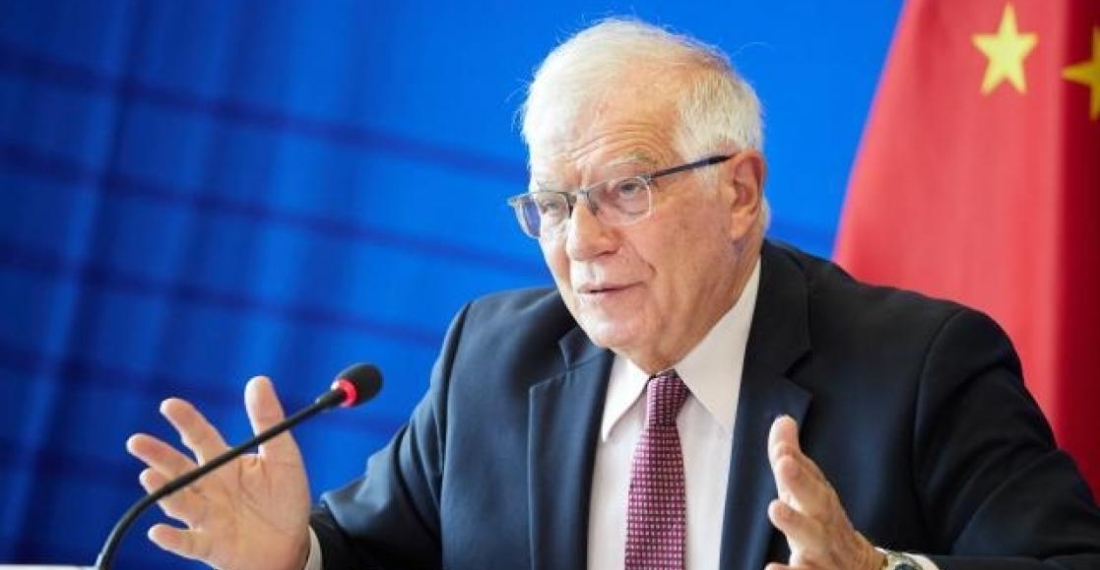The Vice-President of the European Commission and European Union High Representative for Foreign Affairs and Security Policy Josep Borrell addressed the European Parliament on Tuesday (18 April) on "the need for a coherent strategy for EU-China Relations”.
Beginning by recognising that different member states have different interests vis-a-vis China, Borrell said, "if we want to define a coherent EU strategy towards China, it is necessary for each and every EU actor to exercise their respective roles and responsibilities in accordance with, and in full respect of, the Treaties."
The main focus of his address was on integrating "economic security" into wider "national security" strategies.
"This concept of ‘national security’ - ‘economic security’ - will have a determining influence on the way we conceive our foreign relations," Borrell said, adding that the EU should aim to replicate the strategies of the USA and Japan in this regard.
EU must not reject collaboration with China - Borrell
Noting that EU relations with China have "deteriorated substantially" over issues such as Taiwan and economic coercion against Lithuania, Borrell argued, however, that, "China is not Russia [...] We must not reject collaboration with China in solving major global problems because China is not a democracy."
"China burns more coal than the rest of the world all together and is the biggest creditor of emerging countries. And so, from the point of view of the debt or climate, there is no solution to these problems without China's involvement and collaboration."
Borrell said they must continue dialogue with China because of its "colossal influence on the world system".
"For this dialogue to take place in clarity, the positions of the European Union must also be clear and aligned. The plurality of European voices should not be a problem as far as they express a consensual position," Borrell said.
Values, economic security, Taiwan, and Ukraine
Borrell said the four key issues in the EU's relationship with China are "values, economic security, Taiwan, and Ukraine".
On values, saying that "China develops a narrative subordinating fundamental freedoms", Borrell argued that "we want political freedoms, and we want economic progress. And we have to defend this vision and counter the discourse, the Chinese narrative, by all the intellectual means at our disposal."
Economic security
On economic relations and economic security, Borrell began by saying that, "our economic relations are terribly unbalanced. Our trade deficit is abysmal and continues growing."
Cautioning against becoming reliant on cheap Chinese goods from cheap labour, drawing a parallel with Europe having become too reliant on Russian energy, Borrell said that the EU's and China's trading relationship is "unbalanced because our strategic dependence on certain products is very strong and makes us vulnerable."
Borrell spoke about the importance of so-called de-risking, namely the need the diversification of supplies, the reconfiguration of value chains, the control of incoming and outgoing investments, and the development of anti-coercion instruments always in line with WTO rules. "This is economic security," Borrell underlined.
Stressing that he does not envisage the EU uncoupling its economy from China's entirely, Borrell said "we must apply the old recipe of diversifying to reduce our vulnerabilities".
Taiwan
"This is a fundamental issue for Europe for three main reasons," Borrell said. Firstly, because of the strategic value of the Taiwan Strait; secondly, because a "takeover of Taiwan by force" would be unacceptable both in principle and in economic terms; and thirdly, because in order to be a geopolitical power, "it is in our interest to be present everywhere in the world. To reaffirm our positions, to defend our interests, to encourage calmness and to prevent provocations," Borrell said.
Ukraine
On this, Borrell was particularly blunt, saying "the relationship between China and the European Union has no chance of developing if China does not push Russia to withdraw from Ukraine."
"In the face of a conflict involving the territorial integrity and sovereignty of an independent state whose borders are guaranteed by international law and by the great powers, including Russia and China, any so-called neutrality amounts to taking the side of the aggressor," he added.
"The debate on China has only just begun. We must therefore engage it with analytical lucidity, which means a sense of reality, determination and clarity of our positioning and more unity than ever. A unity that is indispensable but that does not exclude the plurality of voices that carry it," he concluded.
The full speech from Josep Borrell can be read here.
source: commonspace.eu with the European Union
photo: European Union






